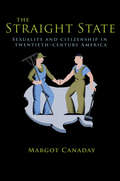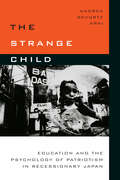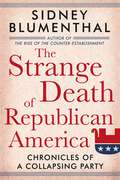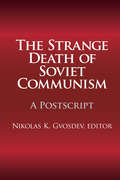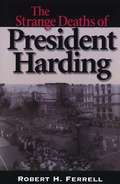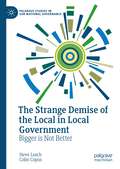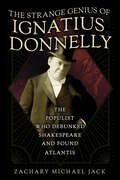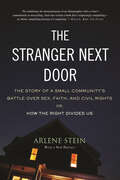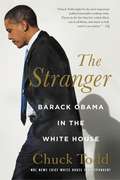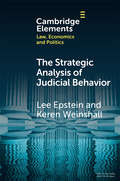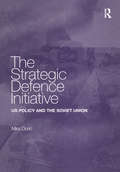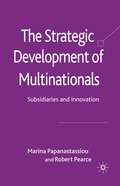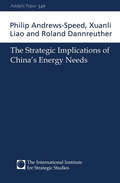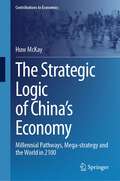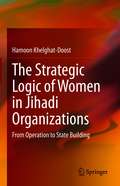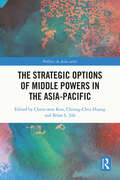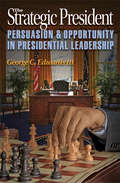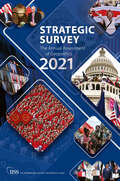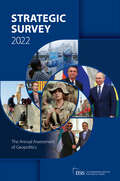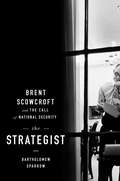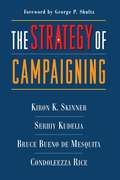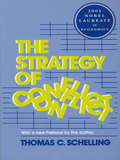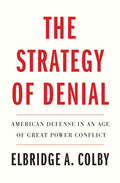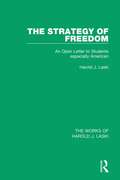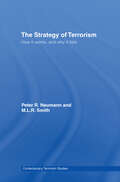- Table View
- List View
The Straight State: Sexuality and Citizenship in Twentieth-Century America (Politics and Society in Modern America #64)
by Margot CanadayHow the government enforced sex and gender conformity and relegated gays to second-class citizenshipThe Straight State is the most expansive study of the federal regulation of homosexuality yet written. Unearthing startling new evidence from the National Archives, Margot Canaday shows how the state systematically came to penalize homosexuality, giving rise to a regime of second-class citizenship that sexual minorities still live under today.Canaday looks at three key arenas of government control—immigration, the military, and welfare—and demonstrates how federal enforcement of sexual norms emerged with the rise of the modern bureaucratic state. She begins at the turn of the twentieth century when the state first stumbled upon evidence of sex and gender nonconformity, revealing how homosexuality was policed indirectly through the exclusion of sexually "degenerate" immigrants and other regulatory measures aimed at combating poverty, violence, and vice. Canaday argues that the state's gradual awareness of homosexuality intensified during the later New Deal and through the postwar period as policies were enacted that explicitly used homosexuality to define who could enter the country, serve in the military, and collect state benefits. Midcentury repression was not a sudden response to newly visible gay subcultures, Canaday demonstrates, but the culmination of a much longer and slower process of state-building during which the state came to know and to care about homosexuality across many decades.Social, political, and legal history at their most compelling, The Straight State explores how regulation transformed the regulated: in drawing boundaries around national citizenship, the state helped to define the very meaning of homosexuality in America.
The Strange Child: Education and the Psychology of Patriotism in Recessionary Japan
by Andrea Gevurtz AraiThe Strange Child examines how the Japanese financial crisis of the 1990s gave rise to "the child problem," a powerful discourse of social anxiety that refocused concerns about precarious economic futures and shifting ideologies of national identity onto the young. Andrea Arai's ethnography details the different forms of social and cultural dislocation that erupted in Japan starting in the late 1990s. Arai reveals the effects of shifting educational practices; increased privatization of social services; recessionary vocabulary of self-development and independence; and the neoliberalization of patriotism. Arai argues that the child problem and the social unease out of which it emerged provided a rationale for reimagining governance in education, liberalizing the job market, and a new role for psychology in the overturning of national-cultural ideologies. The Strange Child uncovers the state of nationalism in contemporary Japan, the politics of distraction around the child, and the altered life conditions of--and alternatives created by--the recessionary generation.
The Strange Death of Republican America: Chronicles of a Collapsing Party
by Sidney BlumenthalSidney Blumenthal—trenchant analyst, best-selling author, and senior adviser to former President Bill Clinton (and more recently, Hillary)—offers a penetrating journalistic and historical examination of the ongoing collapse of Republicanism. Closely charting the Party’s imploding reputation in America and the world, as well as the potential consequences of George W. Bush’s radical presidency for the 2008 election, The Strange Death of Republican America will be required reading for anyone interested in politics and concerned about the fate of the nation. In these essays and opinion columns written by Blumenthal over the past few years for The Guardian of London and salon.com, along with a new and stimulating introduction, Blumenthal provides a unifying and overarching perspective on the Bush years.Blumenthal scrutinizes the past and present state of the Republican Party, which he believes portends the incipient demise of their vaunted political machine and the Republican era since the Nixon administration. The issues on the table range from the legacy of Nixon’s imperial presidency and its influence on Dick Cheney to Karl Rove’s failed strategy for political realignment, as well as conflicts within the military and intelligence communities over Bush’s policies, and the underlying political shifts that are demonstrably weakening the once-strong foundations of Republican philosophy and governance. These essays have the cumulative effect of an irresistible factual and historical tide—a portrait of a party in self-destructive decline that will grab the attention of anyone fascinated by the world of politics. A selection of the Progressive Book Club.
The Strange Death of Soviet Communism: A Postscript (The National Insterest)
by Nikolas GvosdevThe collapse of communism marked the close of an era of world history. What took place in the Soviet Union between 1917 and 1991, in the eyes of its proponents, constituted a "great experiment" in the application of new modes of organization to social life, the largest such experiment in history. The Strange Death of Soviet Communism, which first appeared as a special issue of The National Interest, brings together leading scholars of Soviet history, who show why the experiment failed and how it has destroyed the laboratory of socialist utopias.Francis Fukuyama considers the role of long-term social and intellectual modernization while Vladimir Kontorovich examines the related factor of economic stagnation. Myron Rush then analyzes the accidental and precedent-breaking accession and leadership of Gorbachev. Charles Fairbanks looks at the more general factors of change and rigidity within communist political culture. Chapters by Peter Reddaway and Stephen Sestanovich conclude this section by assessing respectively the role of internal pressure from Soviet citizens and external pressure from the West. The next chapters deal with why the West was surprised by the communist collapse. This involves a critique of Western Sovietology both for its scholarly failures and its ideological prejudices. Here, Peter Rutland and William Odom deal with social science interpretations of the Soviet Union while Robert Conquest and Richard Pipes reflect on historians' readings of Soviet history. Martin Malia then offers a comparative assessment of both. In the third section Irving Kristol and Nathan Glazer discuss communism in relation to the intellectuals in the West.Although the authors are united in their anti-communist stance, the volume is diverse in its perspectives and assessments of Soviet communism. Taken together, these contributions show that the debate on the legacy of communism and a subsequent rethinking of modern history is just beginnin
The Strange Deaths of President Harding
by Robert H. FerrellThe author, a noted presidential historian, re-examines the legends surrounding the death of Warren Harding and the corruption of his administration. Ferrell debunks the story that Harding was poisoned and questions whether he indeed fathered an illegitimate child. He shows how biographers and memoirists have fed the Harding legends since the 1920s, and tries to separate fact from fabrication.
The Strange Demise of the Local in Local Government: Bigger is Not Better (Palgrave Studies in Sub-National Governance)
by Colin Copus Steve LeachThis book challenges the notion that bigger local government is always better. Whilst the central government in Britain has often supported increases in local government size, the book argues that this has been detrimental, and has caused the erosion of distinctive community identities that were previously represented by local authorities empowered to make significant local choices about services and future strategy. Drawing from national and international evidence, it offers an alternative narrative about the size, role, function and purpose of local government to that currently dominating policy discussion. It aims to provide readers who oppose size increases in local government with the evidence and arguments to influence change in their areas. The book will appeal to policymakers working in central and local government, as well as academics interested in public policy, public administration and local government.
The Strange Genius of Ignatius Donnelly: The Populist Who Debunked Shakespeare and Found Atlantis
by Zachary Michael JackThe Strange Genius of Ignatius Donnelly sheds light on the inimitable life of a neglected figure in US political and literary history. The father of American Populism, lieutenant governor of Minnesota, People's Party candidate for vice president, popularizer of the Shakespeare authorship controversy, proponent of the Atlantis theory, and author of bestselling speculative fictions, Ignatius Donnelly (1831–1901) positively defies categorization. Called a crank and a pseudoscientist by some and a genius by others, Donnelly broke all the rules. When skeptics said he was too green for politics, he got elected Minnesota's youngest-ever lieutenant governor. When they said a politician who prized his Irish heritage could never ascend to national office in a state dominated by conservative Scandinavians, he proved his critics wrong again. As Zachary Michael Jack' shows, in the latter half of Donnelly's remarkable life, he generated more fame and infamy than he had as a combative congressman. In an uncanny reversal of the usual midcareer doldrums, Donnelly turned political defeat into an opportunity for personal and professional reinvention, remaking himself as a visionary author and a champion of people-first third-party politics. The man known by enemies and friends alike as the Sage of Nininger pushed through poverty and ignominious defeat to introduce the masses to surprising theories about ancient civilizations, world-ending comets, and cryptograms purported to reveal the true authorship of Shakespeare's plays. At root, The Strange Genius of Ignatius Donnelly reveals the story of a man unafraid to speak truth to power, consequences be damned.
The Stranger Next Door: The Story of a Small Community's Battle over Sex, Faith, and Civil Rights; Or, How the Right Divides Us
by Arlene SteinIn The Stranger Next Door, Alrene Stein explores how a small community with a declining industrial economy became the site of a bitter battle over gay rights. Fearing job loss and a feeling of being left behind, one Oregon town&’s working-class residents allied with religious conservatives to deny the civil liberties of queer men and women. In a book that combines strong on-the-ground research and lucid analysis with a novelist&’s imaginative sympathy, Stein&’s exploration of how fear and uncertainty can cause citizens to shift blame onto &“strangers&” provides insight into the challenges the country faces in the age of Trump. Winner of the 2001 Ruth Benedict Award
The Stranger: Barack Obama in the White House
by Chuck ToddChuck Todd's gripping, fly-on-the-wall account of Barack Obama's tumultuous struggle to succeed in Washington. Barack Obama won the presidency in 2008 partly because he was a Washington outsider. But if he'd come to the White House thinking he could change the political culture, he soon discovered just how difficult it was to swim against an upstream of insiders, partisans, and old guard networks allied to undermine his agenda---including members of his own party. He would pass some of the most significant legislation in American history, but his own weaknesses torpedoed some of his greatest hopes.In THE STRANGER, Chuck Todd draws upon his unprecedented inner-circle sources to create a gripping account of Obama's White House tenure, from the early days of drift and helplessness to a final stand against the GOP in which an Obama, at last liberated from his political future, finally triumphs.
The Strategic Analysis of Judicial Behavior: A Comparative Perspective (Elements in Law, Economics and Politics)
by Lee Epstein Keren WeinshallThe past decade has witnessed a worldwide explosion of work aimed at illuminating judicial-behavior: the choices judges make and the consequences of their choices. We focus on strategic accounts of judicial-behavior. As in other approaches to judging, preferences and institutions play a central role but strategic accounts are unique in one important respect: They draw attention to the interdependent - i.e., the strategic - nature of judicial decisions. On strategic accounts, judges do not make decisions in a vacuum, but rather attend to the preferences and likely actions of other actors, including their colleagues, superiors, politicians, and the public. We survey the major methodological approaches for conducting strategic analysis and consider how scholars have used them to provide insight into the effect of internal and external actors on the judges' choices. As far as these studies have traveled in illuminating judicial-behavior, many opportunities for forward movement remain. We flag four in the conclusion.
The Strategic Defence Initiative: US Policy and the Soviet Union
by Mira DuricCentral to US foreign policy, the Strategic Defence Initiative (SDI) was launched by Ronald Reagan in 1983. While the Reagan administration failed to deploy the SDI system, it featured prominently in the relationship between the US and the Soviet Union. This insightful book examines SDI and the Reagan administration through an evaluation of the role of the SDI in the end of the Cold War. Presenting an extensive range of primary and secondary material together with interviews, the book will be welcomed by academics and upper level students interested in politics and history.
The Strategic Development of Multinationals
by Robert Pearce Marina PapanastassiouGlobalization is a 'buzz-word' for the twenty-first century, but this volume argues that it is not possible to understand the current global economy without understanding the multinational.
The Strategic Implications of China's Energy Needs (Adelphi series #No. 346)
by Roland Dannreuther Philip Andrews-Speed Xuanli LiaoChina is frequently described as a threat to regional and global stability and its rapidly rising demand for imported energy is seens as one cause of this threat. This book shows that domestic politics and foreign policy have both played a part in China's recent major energy policy decisions. However, China's increasing involvement in the global energy markets can be seen as an opportunity to enhance cooperation and interdependence rather than as a threat.
The Strategic Logic of China’s Economy: Millennial Pathways, Mega-strategy and the World in 2100 (Contributions to Economics)
by Huw McKayThis book reviews China’s strategic pathway over the last 1000 years and considers its prospects for ascending to high-income status by the end of the 21st century. It analyzes why, although China’s chances of joining the global core are sound, they are not outstanding; in addition, it faces mounting challenges, internal and external alike. The argument is presented in the framework of dynamic-strategy theory, which is expounded here in novel form. This exposition includes a wide ranging survey of global history, with a focus on the development of the industrialisation paths of the major economies of today, including a detailed study of Japan's long-run strategic pathway. The book’s closing section presents a scenario-based discussion of China’s potential place in the world in 2100. The analysis implies that China’s zenith is likely to be reached slightly before mid-century, after which its relative economic scale will likely decline. Beyond that general finding, the scenarios investigate the wide range of plausible outcomes that China may experience: a range that the author contends is much wider for China than for nations under-pinned by less complex political-economies. Given its scope, the book will appeal to scholars of history, economics, geopolitics and sinology, and to anyone interested in learning about China’s economic prospects at a time of increasingly heated ideological and empirical debates.
The Strategic Logic of Women in Jihadi Organizations: From Operation to State Building
by Hamoon Khelghat-DoostThis book discusses the role of women in jihadi organizations. It explores the critical puzzle of why, despite the traditional restrictive views of Islamic jurisprudence on women’s social activities, the level of women’s incorporation into some jihadi organizations is growing rapidly both in numbers and roles around the world. The author argues that the increasing incorporation of women and their diversity of roles reflect a strategic logic –jihadi groups integrate women to enhance organizational success. To explain the structural metamorphosis of jihadi organizations and to provide insight into the strategic logic of women in jihadi groups, the book develops a new continuum typology, dividing jihadi groups into operation-based and state-building jihadi organizations. The book uses multiple methods, including empirical fieldwork and the conceptual framework of fragile states to explain the expanding role of women within organizations such as ISIS. Addressing a much-overlooked gap in contemporary studies of women’s association with militant jihadi organizations, this book will be of interest to scholars in the field of gender and international security, think tanks working on the Middle East security affairs, activists, policy-makers, as well as undergraduate and postgraduate students undertaking study or research associated with gender and militant non-state actors.
The Strategic Options of Middle Powers in the Asia-Pacific (Politics in Asia)
by Chien-Wen KouThis book analyses the responses of middle powers in the Asia-Pacific toward the contemporary great powers’ rivalry of the United States and China, through specific cases studies of South Korea, Australia, Japan, India, Taiwan, and Vietnam. Presenting local perspectives from multiple middle powers as they face the task of maintaining the international order in light of the recent competition between China and the United States, it further develops theories of foreign policy analyses, forming a systematic framework through initiating crucial concepts, including reluctant hedging, economic statecraft, and strategic position-taking. The contributions also provide an in-depth examination of the contemporary geo-politics of the region, including the impact of both the Trump and Biden administrations, Beijing’s “Wolf Warrior” diplomacy, cross-strait relations with Taiwan, and the influences of Japan, Vietnam, Australia and South Korea, revealing that regional middle powers do indeed exert influence on the direction of regional cooperation in the Asia-Pacific. Providing comprehensive studies of many regional powers in the Asia-Pacific, this will be a valuable resource for scholars and students of International Politics, Asian Politics, Asian Studies as well as policy makers on Asia-Pacific relations.
The Strategic President: Persuasion and Opportunity in Presidential Leadership
by George C. EdwardsHow do presidents lead? If presidential power is the power to persuade, why is there a lack of evidence of presidential persuasion? George Edwards, one of the leading scholars of the American presidency, skillfully uses this contradiction as a springboard to examine--and ultimately challenge--the dominant paradigm of presidential leadership. The Strategic President contends that presidents cannot create opportunities for change by persuading others to support their policies. Instead, successful presidents facilitate change by recognizing opportunities and fashioning strategies and tactics to exploit them. Edwards considers three extraordinary presidents--Abraham Lincoln, Franklin D. Roosevelt, and Ronald Reagan--and shows that despite their considerable rhetorical skills, the public was unresponsive to their appeals for support. To achieve change, these leaders capitalized on existing public opinion. Edwards then explores the prospects for other presidents to do the same to advance their policies. Turning to Congress, he focuses first on the productive legislative periods of FDR, Lyndon Johnson, and Reagan, and finds that these presidents recognized especially favorable conditions for passing their agendas and effectively exploited these circumstances while they lasted. Edwards looks at presidents governing in less auspicious circumstances, and reveals that whatever successes these presidents enjoyed also resulted from the interplay of conditions and the presidents' skills at understanding and exploiting them. The Strategic President revises the common assumptions of presidential scholarship and presents significant lessons for presidents' basic strategies of governance.
The Strategic Survey 2021 (Strategic Survey)
by The International Institute for Strategic StudiesStrategic Survey 2021: The Annual Assessment of Geopolitics provides objective, in-depth analysis by leading experts of the events, actors and forces driving international relations. It is the indispensable guide for policymakers, business leaders, analysts and academics who need to understand the geopolitical and geo-economic trends shaping the global agenda in 2022 and beyond. Key features · Comprehensive annual review of world affairs from the International Institute for Strategic Studies, the leading international research institute that provides objective analysis of military, geopolitical and geo-economic developments that could lead to conflict. · Covers developments in all regions as well as emerging issues and trends not yet on most radars, and analyses the major themes and forces shaping each continent. · Essays on a comprehensive range of global issues including vaccine diplomacy, digital conflict, Europe’s emerging Asia-Pacific strategies, the rise of carbon neutrality, the prospects for Iran’s nuclear programme, and the future of political Islam. · Drivers of Strategic Change for major states: Verified, comparable data on state power that provides a rich and vivid guide to forces underlying geopolitical change. · Data-rich graphics and maps that provide fresh insights into geopolitical change, and a timeline of the key events of 2020–21.
The Strategic Survey 2022
by The International Institute for Strategic StudiesStrategic Survey 2022: The Annual Assessment of Geopolitics provides objective, in-depth analysis of the events that have shaped relations between major powers, region by region, over the past year, and highlights the pressing geopolitical and geo-economic challenges that will shape the international agenda in 2023. It features essays on global issues such as Russia’s war in Ukraine, the arms race in space and the deepening US–China rivalry, as well as in-depth analysis of the major themes shaping each continent. Specially commissioned maps and graphics illustrate major arguments, and multi-source data illuminates longer-term trends in power relations.
The Strategist: Brent Scowcroft and the Call of National Security
by Bartholomew SparrowBased on the full cooperation of the subject--with no restraining conditions--The Strategist provides an in-depth portrait of a man whose career has been intimately linked to the great transformations in U. S. foreign policy, from the last third of the Cold War, to September 11, 2001, and up to the present. Bartholomew Sparrow brings color and focus to the complex and often secretive nature of U. S. foreign policy and strategic adjustments--an intellectual battlefield on which ideas and worldviews clash, in which economics, politics, and strategic concerns intertwine, and in which private citizens and non-office holders may exert as much influence as highly visible Cabinet officials. Among the most important foreign policy minds of the 20th and early 21st centuries, Brent Scowcroft is also among the least well-known or understood. In a now-famous August 2002 Wall Street Journal op-ed titled "Don’t Attack Saddam Hussein,” Brent Scowcroft, who had been national security advisor under President George H. W. Bush, went to war himself, in a sense, with his closest and longest-standing friends. He noted the scant evidence that tied the Iraqi government to terrorist organizations. He warned that an invasion and occupation of Iraq would be costly and potentially disastrous for a variety of carefully considered reasons. He recommended that the Bush administration work with the U. N. Security Council and wait for definitive proof of Saddam’s wrongdoing before taking action. The essay at once made Scowcroft the most outspoken and most credible critic of the Bush administration’s plans for war and immediately generated national controversy. It provoked a sudden, deep split in the Republican Party over the plans for war. Vice President Cheney, National Security Advisor Rice, Defense Secretary Rumsfeld, and President George W. Bush all vigorously reaffirmed their cause and their course of action, and the media and American public opinion soon fell in line. Clearly, Scowcroft, 84, continues to participate in the most central and important debates over U. S. foreign policy and national security. He has been a leading architect of U. S. foreign policy and grand strategy for almost a half-century, and though long out of office, still gives speeches, makes media appearances, and leads tasks forces and commissions. He is a rare creature, one of the few "wise men” of the nation’s capital: someone who is regularly consulted by top government officials in Democratic and Republican administrations, ranking members of the House and Senate from both sides of the aisle, and the country’s leading foreign-policy journalists. As recently as April 2009, Scowcroft co-chaired an extensive Council of Foreign Relations study of the U. S. nuclear weapons policy. More than anyone else, he stands at the center of the United States’ foreign policy establishment. Most significantly, Scowcroft is trusted--a scarce and typically fleeting quality in Washington--and has been for four decades. The unprecedented insights into the man and his career Sparrow offers in The Strategist are vital to anyone who wishes to understand America's changing role in the world.
The Strategy of Campaigning: Lessons from Ronald Reagan and Boris Yeltsin
by Bruce Bueno de Mesquita Kiron K. Skinner Condoleezza Rice Serhiy KudeliaThe Strategy of Campaigningexplores the political careers of Ronald Reagan and Boris Yeltsin, two of the most galvanizing and often controversial political figures of our time. Both men overcame defeat early in their political careers and rose to the highest elected offices in their respective countries. The authors demonstrate how and why Reagan and Yeltsin succeeded in their political aspirations, despite-or perhaps because of-their apparent "policy extremism": that is, their advocacy of policy positions far from the mainstream. The book analyzes the viability of policy extremism as a political strategy that enables candidates to forge new coalitions and outflank conventional political allegiances. Kiron K. Skinner is Associate Professor of International Relations and Political Science at Carnegie Mellon University, a Research Fellow at the Hoover Institution, and a member of the Chief of Naval Operations Executive Panel and the National Security Education Board. Serhiy Kudelia is Lecturer of Politics at Kyiv-Mohyla Academy, Ukraine and advisor to Deputy Prime Minister of Ukraine. Bruce Bueno de Mesquita is Julius Silver Professor and Director of the Alexander Hamilton Center for Political Economy at New York University and a Senior Fellow at the Hoover Institution. Condoleezza Rice is on a leave of absence from Stanford University, where she was a Professor of Political Science and a Senior Fellow at the Hoover Institution. She is currently serving as U. S. Secretary of State.
The Strategy of Conflict: With a New Preface by the Author
by Thomas C. SchellingA series of closely interrelated essays on game theory, this book deals with an area in which progress has been least satisfactory—the situations where there is a common interest as well as conflict between adversaries: negotiations, war and threats of war, criminal deterrence, extortion, tacit bargaining. It proposes enlightening similarities between, for instance, maneuvering in limited war and in a traffic jam; deterring the Russians and one’s own children; the modern strategy of terror and the ancient institution of hostages.
The Strategy of Denial: American Defense in an Age of Great Power Conflict
by Elbridge A. ColbyWhy and how America&’s defense strategy must change in light of China&’s power and ambition&“This is a realist&’s book, laser-focused on China&’s bid for mastery in Asia as the 21st century&’s most important threat.&”—Ross Douthat, New York Times Elbridge A. Colby was the lead architect of the 2018 National Defense Strategy, the most significant revision of U.S. defense strategy in a generation. Here he lays out how America&’s defense must change to address China&’s growing power and ambition. Based firmly in the realist tradition but deeply engaged in current policy, this book offers a clear framework for what America&’s goals in confronting China must be, how its military strategy must change, and how it must prioritize these goals over its lesser interests. The most informed and in‑depth reappraisal of America&’s defense strategy in decades, this book outlines a rigorous but practical approach, showing how the United States can prepare to win a war with China that we cannot afford to lose—precisely in order to deter that war from happening.
The Strategy of Freedom: An Open Letter to Students, especially American (The Works of Harold J. Laski)
by Harold J. LaskiIn this tract, Laski discusses the British case for the destruction of Hitler from the angle of the university student, especially from America, who had doubts about the complexities of the situation. He illustrates why all parties in Britain felt that future freedom of intelligence depended on victory.
The Strategy of Terrorism: How it Works, and Why it Fails (Contemporary Terrorism Studies)
by Peter R. Neumann M.L.R. SmithThis is the first book to set out a comprehensive framework by which to understand terrorism as strategy. It contends that even terrorism of the supposedly nihilist variety can be viewed as a bona fide method for distributing means to fulfil the ends of policy, that is, as a strategy. The main purpose of the work is to describe the dynamics of terr
